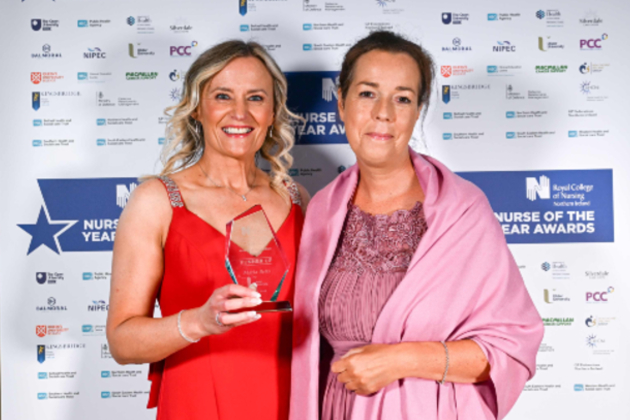Maria Betts is an advanced nurse practitioner in district nursing. Here’s what she does at work.
How would you describe your role in a sentence?
I’m a highly experienced member of the district nursing service, using advanced clinical and diagnostic skills to give people care while allowing them to remain in their own homes.
What’s your nursing background?
I’ve been a registered nurse for 21 years with 18 of these working in the community setting. I have a specialist practice qualification in district nursing, a master's in advanced practice and I’m a non-medical prescriber.
I hold the accolade of Queen’s Nurse collaborating with a network of nurses to improve practice with evidence-based care in the community. I was a runner-up in the RCN Northern Ireland Nurse of the Year awards in 2025 in the Nursing Research category, for my work in palliative care.

What attracted you to district nursing?
I really enjoy treating people in their own homes, because you get that helicopter view of what's going on with the patient, and they generally open up to you more when they're in their own home, rather than in a hospital setting.
I also like being an autonomous practitioner. In Northern Ireland, we’ve had a district nursing career pathway since 2022. I wanted to progress my career, but I wanted to remain working in clinical settings and not go into operational management. So, this was the path for me.
They don't want to be lying on a trolley in a corridor, nearing the end of their life. If we can prevent that, then that's what it's all about.
My role incorporates clinical work, research, education, and leadership. If you asked me "what's your dream job?” this is it.
What are five things you do in an average week?
- Advanced, person-centered clinical assessment of patients.
- Support district nursing teams with advice and education. This includes running bespoke teaching sessions for district nursing teams. I’m also a practice assessor for students completing the prescribing element of their district nursing course.
- Comprehensive geriatric assessments. These are holistic assessments for patients who are living with frailty. I complete their social history and medical history. I review all their medications and carry out a comprehensive physical examination. The aim is to help people to live independently at home and prevent them from attending the emergency department.
- Work on research. This includes promoting evidence-based practice within district nursing; disseminating research results at a local, regional, national and international level; encouraging district nursing staff to undertake research, service evaluations and quality improvement projects; monitoring and improving the quality of health care through research; appraising recent literature and evaluations and applying only that which is robust to improve clinical practice; and publishing studies to peer reviewed journals.
- Contribute to policy making and procedures as part of my leadership role.

What things do you do in this role, that other nursing staff don’t?
I do a lot of what’s called “anticipatory prescribing”, particularly in palliative care and end-of-life care. That means prescribing medications for people who maybe have weeks of their lives remaining. They’re not needing anything at that time, but I can foresee they're going to need symptom management.
I'll prescribe medications, and the family pick them up from the chemist and bring them back to the house, and I will write an authorisation for the nurse to administer the medication. Say a patient becomes unwell on a Sunday and they’re in pain, it means that whenever the nurse is contacted, the medication the patient requires is readily available for the nurse to administer. It's quicker for the patient, the family, the district nursing team and the GP. I've had positive feedback from families on how my role has contributed to their loved one’s palliative journey.
A lot of these patients are very well known to the district nursing team, and they know them best. They don't want to be lying on a trolley in a corridor, nearing the end of their life. If we can prevent that, then that's what it's all about.
District and community nursing across the UK
Maria works in the Northern Health and Social Care Trust in Northern Ireland. But across all four nations of the UK, there are a huge range of roles and settings in which community nurses work.
Five key qualities a nurse needs to do this job?
- Communication and interpersonal skills
- Critical thinking and decision-making
- Compassionate leader
- Autonomy and accountability
- Empathy
What’s most challenging about the job?
The challenge for me is that this is a new role. The advanced nurse practitioner (ANP) position only came to district nursing in the last two years, and it’s new to my organisation since September 2024. I’ve had to figure out how to embed my role into the overall district nursing service.
Our organisation covers the biggest geographical area in Northern Ireland, so it's very hard to spread myself everywhere. And there’s only one of me, I think that's the biggest challenge.
And most rewarding?
I get up in the morning looking forward to work because I enjoy it so much. My days absolutely fly by.
Seeing the difference, we make to our patients and their families is amazing. I remember them all. When you're going into someone's home, they're letting you into their private life. And that's such an honor. When families have taken the time to compliment us, it makes you realise that what you do is worth it. It makes me want to keep going.
What would you say to someone who is thinking of going into this role?
It’s the most rewarding job. I don’t manage staff, so I can completely focus on patients and supporting district nurses and their teams to look after patients.
The course to qualify as an ANP is two years and it’s full-time, so it’s quite intense. But it’s worth it. We’re so blessed to have the career pathway in Northern Ireland, it’s encouraging people to come into district nursing. You see that you're progressing professionally, academically and personally.
People are living longer. But there are far too many people going into hospital when they don't need to. And that's where my role fits in, to try to reduce that number. We just need more of us.
Find out more
- Advanced level nursing: this level is underpinned by a comprehensive range of knowledge, skills and capabilities within each of the four pillars of nursing: clinical practice, education, research and leadership. These will have been developed through studying a master’s degree in a relevant subject area with experiential learning or by demonstrating equivalence. Integration of the capabilities across the four pillars, together with critical reflection, enables a nurse working at the advanced level to function to their full potential and feel empowered to make decisions in the workplace. Read the RCN's definition and standards.
- Advice on planning your nursing career: this RCN resource gives you a range of ideas on the varying roles you could enjoy throughout your health and social care career.
- Roadmap to the future: RCN career frameworks show the routes you can take in your career.








